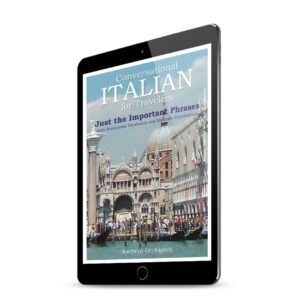The Italian Verb Volere
Volere means “to want” or “to desire,” and is classified as a modal, or helping verb. This means that volere provides information about one’s wish or intention to complete the main action described in a sentence. When used in this way, volere is conjugated to reflect the speaker and the action verb follows directly after in its infinitive form — that is, the action verb is not conjugated! (Remember that Italian verbs are categorized into three infinitive forms by the following endings: -are, -ere, and -ire, and that English infinitive verbs are preceded by “to,” as in, “to go” “to stay,” etc.)
One can imagine the infinite number of uses for the helping verb volere. This blog will focus the use of volere in the conditional tense as a verb of politeness, with emphasis on how to use the first person singular io (I), and first person plural, noi (we), conjugations, which are vorrei and vorremmo. Vorrei translates as “I would like” and vorremmo as “we would like.” Of course, polite communication is essential to show respect for others in any language and it is especially important when traveling in Italy to make a good impression, or fare una bella figura!
One simple way to use volere while traveling in Italy is to connect the conditional first person singular and plural forms of volere, which are “vorrei” and “vorremmo,” with an action verb in the infinitive.
This will enable travelers to ask for whatever they need with the polite phrases, “I would like…” and “We would like…”
The beauty of this method, which uses [vorrei/vorremmo + infinitive verb] is that it is easy to describe an action you wish for without conjugating.
If you want something — such as food or drink at an Italian cafe, or to buy an article of clothing or souvenir at a stylish Italian shop, just follow vorrei or vorremmo with a definite article and the noun for the object you desire.
The traveler only needs to remember the helping verbs vorrei and vorremmo and the meaning of the action verb or the noun that is the object of their desire.
There is essentially no need to conjugate using this method!
In the following sections, we will discuss how Italian travelers can purchase tickets at the train station, make reservations at a hotel, speak to an associate over the phone, or order at a restaurant simply by using [vorrei + infinitive verb or noun]. We will also discuss how to use the first person plural conditional vorremmo when making requests at a restaurant for the entire table.
Vorrei is an important verb of politeness to remember when asking for what you need at a friend’s house as well.
Finally, if you do not want to do something, simply place the Italian adverb non before the verb voglio, which is the present tense conjugation of volere, in order to make your wish known in the strongest manner possible.
Of course, the phrases given in the example sections use this method can be extrapolated to include many different situations!
How to Conjugate Volere
Volere is an irregular -ere verb in the present tense. As noted in the first section, this verb is essential to commit to memory!
In general, people tend to express their own desires (I want…) or the needs of a group (we want…) if traveling with family or a group or friends. The complete present tense conjugation of volere is below, with the commonly used conjugations printed in green: io (I) and noi (we).
| io | voglio |
| tu | vuoi |
| Lei/lei/lui | vuole |
| noi | vogliamo |
| voi | volete |
| loro | vogliono |
The conditional form of volere is especially important for travelers to remember, as it is considered more polite in Italy to use vorrei, which means “I would like…” rather than the more demanding voglio, for “I want…” In general, politeness is appreciated by the people in a host country and usually returned with the same.
The Italian conditional tense is often taught at the intermediate or advanced level, along with the construction of compound sentences that use the subjunctive mood. However, for the traveler, it is not necessary to understand all the complexities of how to use volere in the conditional tense. Instead, just remember the conjugated forms in green given below to ask politely for what you or your family and friends need. Follow the conjugated verb in the conditional tense with an infinitive verb or the item you desire.
The complete present tense conjugation of volere is below, with the important conjugations of politeness that are the focus of this blog in green: io (I) and noi (we).
| io | vorrei |
| tu | vorresti |
| Lei/lei/lui | vorrebbe |
| noi | vorremmo |
| voi | vorreste |
| loro | vorrebbero |
Knowing how to conjugate volere is only the first step needed to express what we need. After “I want,” we often must add another verb to express what we want to do — to go, to return, to buy, etc. Here is how this is done:
First conjugate the verb volere into voglio or vorrei. Then simply add the infinitive form of an action verb directly after the conjugated form of volere. This is the same as we would do in English! The verb volere is known as a helping verb for the way that it modifies, or adds to, the meaning of the main verb in the sentence.
Notice that the subject pronoun io is not included in the Italian example sentences below that use volere, since subject pronouns are almost always left out of Italian sentences. For this reason, “I” is given in parenthesis in the English translation.
| Voglio andare in Italia. | (I) want to go to Italy. |
| Voglio tornare lunedì. | (I) want to return Monday. |
| Vorrei comprare un biglietto. | (I) would like to buy a ticket. |
Vorrei — I Would Like!
1. Use voglio or vorrei at the train station to purchase a ticket.
- Use either voglio or vorrei when speaking with the attendant at the train station to purchase a ticket.
- Although one could use voglio for “I want,” as noted in the earlier sections of this blog, when making a request, it is considered more polite to use vorrei instead, which means, “I would like.”
- Notice in the examples below that Italians say they want a ticket for a certain place, with the word per, rather than the more usual English to.
- The Italian verb desiderare (to want /to desire/to crave) can be used as an alternative to the verb volere. Desiderare is commonly used by clerks or shopkeepers as a polite way to ask what the client wants with the question, “Desidera?” Desiderare and can also be used to reply, “Desidero…” “I want/desire…”
- The last example uses the pronominal verb volerci to ask, “how much time” is available to make the connection between trains. If you need a refresher on how to use volerci, visit the blog, For Italians: How Much Time Will it Take?
- Of course, one does not have to purchase a train ticket in person now-a-days. It is also possible to purchase tickets for the national train system, Trenitalia, from the automatic ticket dispensing machines found at most stations. Tickets can also be purchased online by using the Trenitalia website. For the fastest, most luxurious way to make a connection between the major Italian cities, look under the tab Le Frecce on the Trenitalia website for the high speed trains Frecciarossa, Frecciargento, and Frecciabianca.
| Desidera? Desidero un biglietto per Milano. |
What do you want/need? (polite) I want a ticket for Milan. |
| Vorrei un biglietto per Milano. | I would like a ticket for Milan. |
| Vorrei un biglietto di andata e ritorno. | I would like a round trip ticket. (lit. a ticket of going and returning) |
| Vorrei il diretto. | I would like a direct train (non-stop train). |
| Voglio prendere il treno diretto. | I want to take the direct train (non-stop train). |
| Voglio prendere il treno diretto per Milano. | I want to take the direct train for Milan. |
| Devo pagare il supplemento? | Must (I) pay an extra fee (for fast trains)? |
| Vorrei il locale. | I would like the local (many stops on the route). |
| Cambio/Cambi treno a… | I/You change train(s) at… |
| Non vorrei cambiare treno. | I don’t want to change train(s). |
| Devo cambiare treno? | Must I change trains? |
| Quanto ci vuole per la coincidenza? | How much time is needed for the connection? |
2. Use vorrei when making reservations at a hotel or restaurant
- Combine vorrei with various Italian infinitive verbs to make, cancel, change, check, or confirm a reservation. One can also call room service to order breakfast or dinner.
- Desidero is also appropriate to use in these situations.
| Vorrei/Desidero… | I would like/I want to… |
| …fare una prenotazione. | …make a reservation. |
| …annullare una prenotazione. | …cancel a reservation. |
| …cambiare una prenotazione. | …change a reservation. |
| …controllare una prenotazione. | …check a reservation. |
| …confermare una prenotazione. | …confirm a reservation. |
| …ordinare il servizio in camera. …ordinare la prima colazione. …ordinare la cena. |
…order room service. …order breakfast. …ordinare dinner. |
3. Use vorrei as a polite way to ask to speak with a business associate during a telephone conversation.
A typical telephone conversation using the Italian polite (pol.) Lei conjugation might go something like this:
| Pronto. Sono il signor Rossi. | Ready (for hello). I am Mr. Rossi. |
| Vorrei parlare con la signora Manzini. | I would like to speak with Mrs. Manzini. |
| Mi può passare il direttore, per piacere? | Can you put me through to (give me) the director? (pol.) |
| Me lo/la può passare? | Can you put him/her through to me? (pol.) |
4. Use vorrei as a polite way to leave a message on a voicemail.
A typical formal voicemail might go something like this:
| Sono la signora Manzini. | I am Mrs. Manzini. |
| Vorrei parlare di… | I would like to talk about… |
| Oggi è lunedì tre agosto, alle dieci. | Today is Monday, August third, at ten o’clock. |
| Il mio numero di telefono è… | My telephone number is… |
5. Use vorrei to order at a restaurant
- When ordering a meal at a restaurant, the io (I) and noi (we) forms of the verb volere are both used frequently, since requests are usually made for oneself or for the entire table.
- To order your own dish, use vorrei for “I would like…”
- To order food or drink to be shared by all seated at the table, such as bread, a bottle of water, or a bottle of wine, use vorremmo for “We would like…”
- There is usually a small charge for the bread served with a meal in Italy, called the “pane e coperto” (bread and cover charge), and an additional charge if more bread is ordered. This charge is usually posted by the cash register or listed in the menu.
- When ordering water, it is necessary to specify if you would like still or sparkling water. Also, it should be noted that one does not usually find ice in the cold drinks served in Italy; either because the restaurant does not have space for an ice machine or more simply because Italians often believe that very cold drinks are not good for one’s health!
- By convention, Italians say they would like “some wine” rather than just “wine” or “the wine.” To make the Italian adjective that corresponds to the English “some,” the Italian preposition di must be combined with the definite article for the noun that follows. So for “some wine” combine [di + il] to make “del vino.” (The full explanation of this rule will be the topic of a future blog!)
- Italian menus are arranged in the order that each course is served. Selections start with the appetizer course (l’antipasto) and progresses to the first course (il primo), second course (il secondo), and dessert (la dolce). Don’t forget to look under the list for i contorni (side dishes) if you would like to order a vegetable with your main course. Vegetables are generally served separate from, but along with, the second course!
Below is an example of a how to order for a formal dinner at an Italian restaurant. You will find an entire section on the delicious Italian food and unique drinks that can be ordered in Italy in the Conversational Italian for Travelers pocket book “Just the Important Phrases.” Carry this small, lightweight book with you into an Italian restaurant to read short descriptions about the various types of pasta, main courses, and desserts to discover in Italy!
| Che cosa ha scelto/avete scelto? | What have you/you all chosen? |
| Vorrei… | I would like… |
| …per antipasto, l’insalata mista. | …for the antipasto, mixed salad. |
| …per primo, le tagliatelle alla bolognese. | …for the first course, tagliatelle pasta with Bolognese meat sauce. |
| …per secondo, l’osso bucco. | …for the second course, braised veal shank. |
| …per dolce, solamente frutta. | …for dessert, only fruit. |
| Vorremmo una bottiglia d’acqua naturale. Vorremmo una bottiglia d’acqua gassata. Vorremmo una bottiglia d’acqua minerale. |
We would like a bottle of still water. We would like a bottle of sparkling water. We would like a bottle of mineral water. |
| Vorremmo una bottiglia del vino della casa. Vorremmo del vino rosso. Vorremmo del vino bianco. |
We would like a bottle of the house wine. We would like (some) red wine. We would like (some) white wine. |
6. Use vorrei at breakfast after staying overnight as a guest in another’s home.
- Even in someone’s home, vorrei is always a good verb to remember in order to be polite to describe what you would like.
- The present tense “familiar you” of volere, which is vuoi, is used in the example conversation below to ask a house guest what they need. In a hotel, it is more likely that the “polite you” form, vuole, would be used. Of course, at a hotel one is also likely to hear a simple, “Desidera?” which is the “polite you” form of desiderare.
- Finally, a colloquial way to ask if a guest needs something uses the Italian verb servire, with the phrase, “Ti serve (qualcosa)? for “Do you need (something)?” Replace “something” with the Italian definite article and its noun for an essential item, such as a plate, cup, or spoon necessary for enjoying a meal. For example. “Ti serve un cucchiaino per il caffé?” means, “Do you need a teaspoon for the coffee?” If you need a refresher on how the Italian verb servire works, visit our blog in this series entitled, How to Say “I need” in Italian.
A typical morning conversation might go something like this:
| Buon giorno. Hai dormito bene? |
Good morning. (Did) you sleep well? (lit. Have you slept well?) |
| Si, molto bene, grazie. | Yes, very well, thank you. |
| Si, ho dormito molto bene, grazie. | Yes, (I) slept very well, thank you. |
| Vuoi un caffè? | (Do) (you) want a (cup of ) coffee? |
| Si, vorrei un caffé. | Yes, (I) would like a coffee. |
| Si, vorrei una tazza di caffè. | Yes, (I) would like a cup of coffee. |
| Si, vorrei del caffè. | Yes, (I) would like some coffee. |
| Vuoi del tè? | (Do) (you) want some tea? |
| Si, vorrei un tè. | Yes, (I) would like a (cup of) tea. |
| No, vorrei un bicchiere di… | No, (I) would like a glass of... |
| …acqua. | …water. |
| …succo d’arancia. | …orange juice. |
| Vorrei un biscotto. | (I)would like a cookie. (usually with coffee) |
| Vorrei dei biscotti. | (I) would like some cookies. (usually with coffee) |
7. Many common expressions use vorrei as a polite way to make a request.
| Vogliamo sederci? | Shall we sit down? |
| Non vuole accomodarsi? | Won’t you make yourself comfortable/sit down? |
| Vuoi chiudere la porta? | Would you mind closing the door? |
| Prendi quello che vuoi. | Help yourself./Take as much (of it) as you like. |
| Ne vuoi ancora? | Would you like some more (of it)? |
8. Use non voglio to express what you don’t want to do.
- Use voglio with the Italian negative non to express what you don’t want to do. “Non voglio…” means, “I don’t want…” Follow non voglio with the infinitive verb for what you don’t want to do or the definite article and noun for something you don’t want. Follow the infinitive verb with the Italian prepositions “a” or “di” that typically follow certain verbs. (For a list of these verbs, visit previous blogs in this series: How to Use “di” in Italian and Italian Preposition “A” or “In”?
- One could also use the less forceful non vorrei for “I would not like…”
- Of course, there are many situations in which one may want to say, “I don’t want to…” How many more can you think of?
| Non volgio andare a scuola. | (I) don’t want to go to school. |
| Non voglio venire a casa presto. | (I) don’t want to come home early. |
| Non voglio uscire stasera. | (I) don’t want to go out tonight. |
| Non voglio uscire per cena stasera. | (I) don’t want to go out for dinner tonight. |
| Non voglio uscire con Francesca. | (I) don’t want to go out with Francesca. |
Remember how to ask for what you need with
vorrei and vorremmo and I guarantee you will use
volere every day!
For “All the Italian you need to enjoy your trip to Italy,” click on the links below to purchase my Conversational Italian for Travelers books – Kathryn Occhipinti


 Fra Noi Embrace Your Inner Italian
Fra Noi Embrace Your Inner Italian






